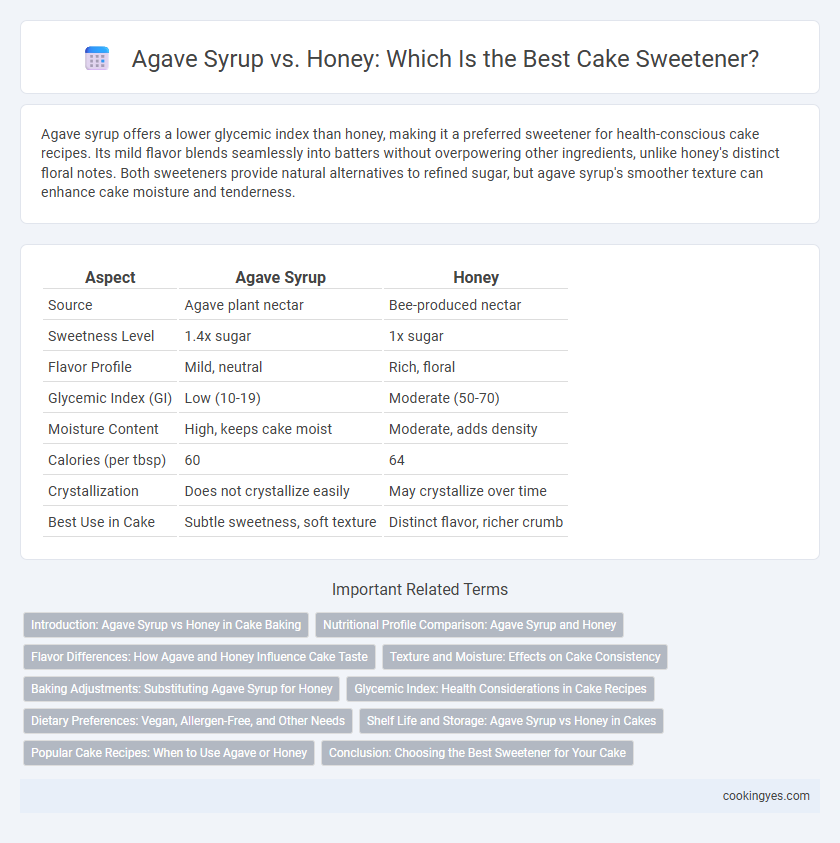Agave syrup offers a lower glycemic index than honey, making it a preferred sweetener for health-conscious cake recipes. Its mild flavor blends seamlessly into batters without overpowering other ingredients, unlike honey's distinct floral notes. Both sweeteners provide natural alternatives to refined sugar, but agave syrup's smoother texture can enhance cake moisture and tenderness.
Table of Comparison
| Aspect | Agave Syrup | Honey |
|---|---|---|
| Source | Agave plant nectar | Bee-produced nectar |
| Sweetness Level | 1.4x sugar | 1x sugar |
| Flavor Profile | Mild, neutral | Rich, floral |
| Glycemic Index (GI) | Low (10-19) | Moderate (50-70) |
| Moisture Content | High, keeps cake moist | Moderate, adds density |
| Calories (per tbsp) | 60 | 64 |
| Crystallization | Does not crystallize easily | May crystallize over time |
| Best Use in Cake | Subtle sweetness, soft texture | Distinct flavor, richer crumb |
Introduction: Agave Syrup vs Honey in Cake Baking
Agave syrup and honey are popular natural sweeteners used in cake baking, each offering distinct flavor profiles and sweetness levels. Agave syrup has a lower glycemic index, making it a preferred choice for those seeking to manage blood sugar, while honey provides a rich, floral taste that enhances cake complexity. Choosing between agave syrup and honey depends on the desired texture, moisture retention, and flavor nuances in the final cake.
Nutritional Profile Comparison: Agave Syrup and Honey
Agave syrup contains a higher percentage of fructose compared to honey, resulting in a lower glycemic index that may provide more stable blood sugar levels when used as a cake sweetener. Honey offers a richer nutrient profile, including trace amounts of vitamins, minerals, and antioxidants, which can enhance the cake's nutritional value. Both sweeteners provide natural alternatives to refined sugar, but honey's additional bioactive compounds contribute to its superior health benefits in baking.
Flavor Differences: How Agave and Honey Influence Cake Taste
Agave syrup imparts a mild, neutral sweetness with subtle caramel notes, creating a light and consistent flavor in cakes, while honey delivers a robust, floral, and sometimes fruity complexity that enhances the cake's depth. The distinct flavor compounds in honey can intensify aroma and add a rich, moist texture compared to agave syrup's cleaner, less intrusive profile. Selecting between agave syrup and honey affects not only sweetness level but also the overall sensory experience and flavor balance of the cake.
Texture and Moisture: Effects on Cake Consistency
Agave syrup enhances cake texture by contributing to a moist and tender crumb due to its high fructose content and liquid form, which retains moisture effectively. Honey also adds moisture but can result in a denser texture because of its thicker consistency and complex sugars that caramelize during baking. Choosing agave syrup over honey often yields a softer, more evenly moist cake, while honey imparts a richer flavor but may compromise lightness and fluffiness.
Baking Adjustments: Substituting Agave Syrup for Honey
When substituting agave syrup for honey in cake recipes, reduce the liquid ingredients slightly since agave syrup has a higher water content, approximately 70%, compared to honey's 17%. Agave syrup's milder flavor and lower viscosity require adjusting baking time and temperature to prevent over-browning or excessive moisture retention, typically lowering oven temperature by 25degF. Use a ratio of 2/3 cup agave syrup per 1 cup of honey for optimal sweetness balance and texture in cakes.
Glycemic Index: Health Considerations in Cake Recipes
Agave syrup has a glycemic index (GI) of around 15, making it a low-GI sweetener ideal for maintaining stable blood sugar levels in cake recipes. Honey, with a higher GI ranging from 45 to 64 depending on the variety, can cause quicker blood sugar spikes when used as a cake sweetener. Choosing agave syrup over honey can benefit those managing insulin sensitivity or seeking better glycemic control in desserts.
Dietary Preferences: Vegan, Allergen-Free, and Other Needs
Agave syrup serves as a popular vegan alternative to honey, making it ideal for plant-based diets and those seeking allergen-free sweeteners due to its low allergenic potential. Honey, while natural and rich in antioxidants, is not suitable for vegans and may trigger allergies in sensitive individuals. For cakes requiring strict adherence to vegan, allergen-free, or specific dietary needs, agave syrup provides a versatile, mild-flavored option that blends well without compromising texture or taste.
Shelf Life and Storage: Agave Syrup vs Honey in Cakes
Agave syrup offers a longer shelf life than honey when used as a cake sweetener, typically lasting up to two years if stored in a cool, dark place. Honey's natural antibacterial properties allow it to remain stable indefinitely without spoiling, but it can crystallize over time, affecting texture in baked goods. Proper storage of both sweeteners in airtight containers preserves their quality and extends usability for cake recipes.
Popular Cake Recipes: When to Use Agave or Honey
Agave syrup's mild flavor and lower glycemic index make it ideal for moist cakes like carrot or lemon pound cake, preserving delicate flavors while adding sweetness. Honey's robust, floral notes complement spiced cakes such as gingerbread or banana bread, enhancing depth and moisture retention. Choosing between agave and honey depends on the desired sweetness intensity and flavor profile in popular cake recipes.
Conclusion: Choosing the Best Sweetener for Your Cake
Agave syrup offers a lower glycemic index and a milder flavor, making it ideal for cakes where subtle sweetness and moisture retention are desired. Honey provides a richer taste and natural antibacterial properties, enhancing flavor complexity and shelf life in baked goods. Selecting between agave syrup and honey depends on nutritional goals, flavor preferences, and the specific texture you want to achieve in your cake.
Agave Syrup vs Honey for Cake Sweetener Infographic

 cookingyes.com
cookingyes.com